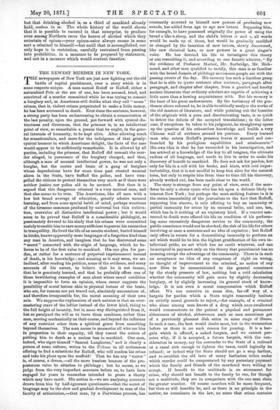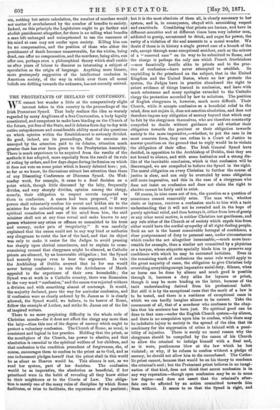THE NEWEST MURDER IN NEW YORK.
THE newspapers of New York are just now fighting out the old battle of capital punishment, over a story which is in some respects unique. A man named Ruloff or Rulloff, either a naturalized Pole or the son of one, has been accused, tried, and convicted of a murder committed while he was trying to commit a burglary and, as Americans still dislike what they call " mean" crimes, that is, violent crimes perpetrated to make a little money, he has been sentenced to death. Ever since the sentence, however, a strong party has been endeavouring to obtain a commutation of the last penalty, upon the ground, put forward with cynical dis- tinctness and directness, that the prisoner is, in an intellectual point of view, so remarkable a person that he ought, in the gene- ral interests of humanity, to be kept alive. After allowing much for sensationalism, and more for the indulgence of that grimly- cynical humour in which Americans delight, the facts of the case would appear to be sufficiently remarkable. It is allowed by all parties, including the prisoner, that Rulloff did commit the mur- der alleged, in pursuance of the burglary charged, and that although a man of unusual intellectual power, he was not only a barglar, but the centre and brain of a gang of burglars whose depredations have for some time past created unusual alarm in the State, have baffled the police, and have com- pelled the citizens to protect themselves very much as if there were neither justice nor police aid to be secured. But then it is argued that this dangerous criminal is a very unusual man, and that also seems to be true. The Americans, like all men with a low but broad average of education, greatly admire unusual learning, and from some special habit of mind, perhaps weariness of the tiresome sameness produced by universal but thin cultiva- tion, overvalue all distinctive intellectual power ; but it would seem to be proved that Rulloff is a considerable philologist, so passionately devoted to his study that his crimes were committed mainly to enable him to earn moneystifficient to pursue his researches in tranquillity. He lived the life of an ascetic student, buried himself in books, knows apparently more languages of a forgotten kind than any man in America, and imagines that he has discovered some " secret" connected with the origin of language, which he be- lieves to be of the first value to mankind. His one plea for par- don, or rather for a sentence of perpetual imprisonment instead of death, is his knowledge ; and amazing as it may seem, we are inclined, after reading his petition, some of the evidence, and many accounts of his career, to believe that he is not insane, that he is genuinely learned, and that he probably offers one of those bewildering examples of men about whose moral condition it is impossible to form an opinion, whose career suggests the possibility of moral lesions akin to physical lesions of the brain, who are, for reasons not yet traced out, absolutely unconscious of, and therefore irresponsible for, the moral meaning of their own acts. We suppose the explanation of such natures is that an over- mastering crave of the loftier instead of the lower kind, rising to the full height of insanity, but in some way distinguished from it, has so paralyzed the will as to leave them machines, rather than men, moving mechanically on their course, and beyond the influence of any restraint other than a spiritual grace from something beyond themselves. The man seems to mesmerize all who see him in proportion to their capacity, till they resent the notion of putting him to death as a useless loss to mankind. One man, indeed, who signs himself "Samuel Langhorne," and is clearly a person of some culture, writes to the Tribune in all seriousness offering to find a substitute for Rulloff, who will confess his crime and take his place upon the scaffold! That he has any " secret " is, of coarse, a dream,—all the more baseless because of the pre- posterous value he attaches to philology ; but he seems, as we judge from the very imperfect accounts before us, to have been engaged for years in researches intended to prove a theory which may have merit. His notion is—we are analyzing accounts drawn from him by half-ignorant questioners—that the secret of language may be the slow and gradual development in man of the faculty of articulation,—that man, by a Darwinian process, has constantly accreted to himself new powers of producing new sounds, has added from age to age new letters. Supposing him, for example, to have possessed originally the power of using the broad a like a sheep, and the child's letters In and n, all words would be made up of those, but would be gradually modified or changed by the insertion of new letters, slowly discovered, like new chemical laws, or new powers in a great singer's voice. He has devoted his life to investigate this theory or one resembling it, and according to one fanatic admirer, " By the evidence of Professor Mather, Mr. Surbridge, Mr. Rich- mond, and other men qualified to testify, this man is as familiar with the broad domain of philology as common people are with the passing events of the day. His memory has such a limitless grasp that he is able to quote sentence after sentence, paragraph after paragraph, and chapter after chapter, from a gnarled and knotty ancient literature that ordinary scholars are capable of achieving a little more than a bowing acquaintance with. But his memory is the least of his great endowments. By the testimony of the gen- tlemen above referred to, he is able to critically analyze the works of the old masters of literature, and while pointing out the beauties of the originals with a pure and discriminating taste, is as quick to detect the defects of the accepted translations ; in the latter case, if exceptions be taken to his judgment, he straightway opens up the quarries of his exhaustless knowledge and builds a very Chinese wall of evidence around his position. Every learned man who enters Rulloff's presence leaves it amazed and con- founded by his prodigious capabilities and attainments." His own idea is that he has succeeded in his investigation, and has arrived at a knowledge of the key to all tongues, the ultimate radices of all language, and needs to live in order to make his discovery of benefit to mankind. He does not ask for pardon, but only for life in a cell with his books, and hints, with cool imper- turbability, that it is not needful to keep him alive for the natural term, but only to respite him from time to time till his discovery, already worked out, has been made clear to the world.
The story is strange from any point of view, even if the mur- derer be only a clever cynic who has hit upon a defence likely to interest New York ; but perhaps the most striking feature in it is the entire insensibility of the journalists to the fact that Runoff, supposing him sincere, is only offering to buy an immunity or partial immunity for crime by an unusual bribe, and one, too, which has in it nothing of an expiatory kind. If a convict sen- tenced to death were offered his life on condition of his perform- ing some excessively dangerous service to the community, the public conscience would not be shocked, the risk of his life for others involving at once a sentence and an idea of expiation ; but Rulloff only offers in return for a demoralizing immunity to perform an act which would be to him the highest gratification of his own in- tellectual pride, an act which has no merit whatever, and can be accepted in payment only on the theory that punishment has no meaning except the advantage of the community. There is in such an acceptance no idea of any vengeance of right on wrong, no thought of improvement to the criminal, no notion of any new fibre to be communicated to the general conscience by the steady pressure of law, nothing but a cold calculation whether the community will gain more by slightly decreasing burglary, or by slightly increasing its general stock of know- ledge. It is not even a moral compensation which Rulloff offers. We can conceive in some dim, far-off way of, a bargain for pardon which a State might reasonably hesitate on strictly moral grounds to reject,—for example, of a criminal who alone among men knows of a drug which once swallowed would communicate to the patient a physical and permanent abhorrence of alcohol, abhorrence such as men sometimes get of a previously pleasant dish eaten in some stage of illness. In such a case, the best would doubt most, but in the transaction before us there is no such reason for pausing. It is a bar- gain which is offered, a naked bargain, and we cannot per- ceive why, if it is accepted, a future bargain, with the con- sideration in money, say the surrender to the State of a railroad or a canal rich enough to lighten the taxes, could logically be refused ; or indeed why the State should not go a step farther, and re-establish the old laws of many barbarian tribes under which murder could be compensated by any pecuniary payment which the family and friends of the murdered were willing to accept. If benefit to the multitude is an atonement for crime, why should not benefit to the family be one, for though not a multitude, they are in comparison with the one man slain the greater number. Of course murders will be more frequent, but then so will benefits be, and as there is no principle in the matter, no conscience in the law, no sense that crime contains
sin, nothing but astute calculation, the number of murders would not matter if overbalanced by the number of benefits to society. Indeed, on this principle the Legislature ought to go farther and abolish punishment altogether, for there is no telling what benefits a man left unhanged and unimprisoned to use the resources of his mind at ease may not confer upon society. Killing him can be no compensation, and the position of those who abhor the punishment of death becomes unanswerable, for the victim, being dead, can offer no compensation, and the murderer, being alive, can offer one, perhaps even a philosophical theory which shall enable us after years of labour to discover so interesting a subject of speculation as the origin of language. Anything more bizarre, more grotesquely suggestive of the intellectual confusion in American society, of the way in which over there all moral beliefs are drifting towards the unknown, has not recently arrived.



































 Previous page
Previous page